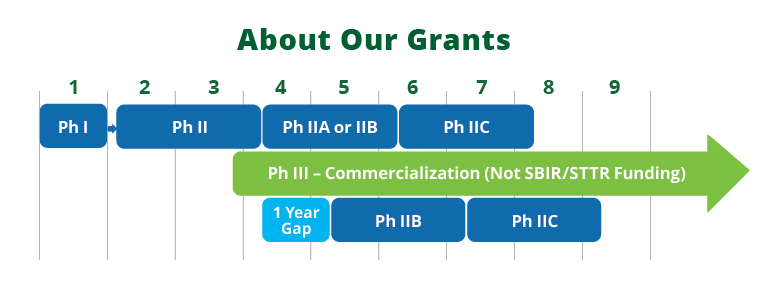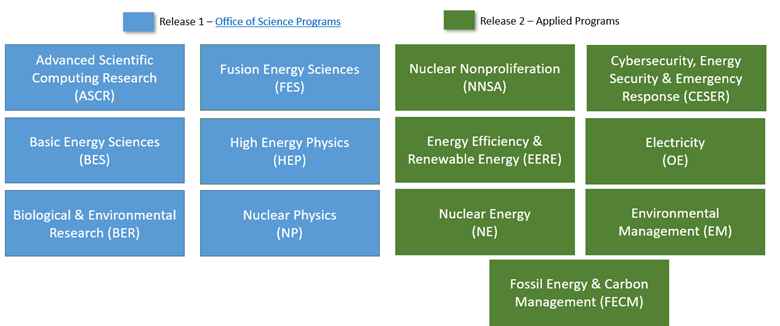About

New to the DOE SBIR & STTR Programs?
We encourage all to start out by watching our two minute Programs Overview Video. For a deeper dive, please watch the Overview Webinar. The overview webinar is about 25 minutes and provides an in-depth understanding of the purpose of the programs, the technology areas covered, and the grant application process. To just view the presentation slides, click here.
SBIR/STTR Programs Goals
The Small Business Innovation Research (SBIR) Program was established by Congress in 1982 [Public Law 97-219]. It major goals are to:
- Stimulate technological innovation
- Use small business to meet Federal R/R&D needs
- Foster and encourage participation by the socially and economically disadvantaged small businesses, and those that are 51 percent owned and controlled by women, in technological innovation
- Increase private sector commercialization of innovations derived from Federal R/R&D, thereby increasing competition, productivity, and economic growth
The Small Business Technology Transfer (STTR) Program was established by Congress in 1992 [Public Law 102-564]. Its major goals are to:
- Stimulate and foster scientific and technological innovation through cooperative research and development carried out between small business concerns and research institutions
- Foster technology transfer between small business concerns and research institutions
Through subsequent reauthorization for both programs [Public Laws 106-554, 107-50, 112-81], Congress has continued to expand and evolve the programs. Examples include the requirement for proposal evaluation to consider commercial potential of the proposed R&D, periodic evaluations of the SBIR/STTR programs by the National Academies and the Government Accountability Office, and the establishment of pilot programs to evaluate potential program improvements.
The Federal SBIR STTR Programs were reauthorized on September 30, 2022, when the SBIR/STTR Extension Act of 2022 became law. This Act extends the SBIR STTR Programs through to September 30, 2025.
SBIR and STTR Have Three Distinct Phases

| Phase I | Phase II/IIA/IIB/IIC | Phase III |
|---|---|---|
| Feasibility/Proof of concept 6 to 12 months in duration Awards up to $200,000 or $250,000 |
Prototyping & Demonstration Up to 2 years in duration Awards up to $1.1M or $1.6M (Phase II Only) Pursuit of commercialization |
Not SBIR funding Work that derives from, extends or completes the effort of prior Phase I and II awards Pursuit of commercialization Read More |
How much money is set aside?
Each Fiscal Year (FY), the 11 participating SBIR and STTR federal agencies set aside a percentage of their extramural R&D budgets for these programs. Extramural refers to federal funding that an agency awards to external entities such as universities, national laboratories, and private businesses to address the principal agency mission needs.
The SBIR and STTR allocations have been constant during the period of 2019 to 2023 at 3.2% and 0.45% of agency extramural R&D for SBIR and STTR, respectively.
In FY 2022, DOE issued $348 million in SBIR/STTR awards to over 650 small businesses.
SBIR.gov
The Small Business Administration serves as the Administrator for the federal SBIR/STTR programs and establishes policy directives for their operation. More information about the federal SBIR/STTR programs can be found at their website.
DOE SBIR & STTR PROGRAMS RESEARCH AREAS
Within DOE the following R&D Programs participate in the DOE SBIR & STTR Programs. Click on each office to read about their mission and research areas.

SBIR/STTR topics are drawn from the mission areas of the participating programs. ARPA-E runs its own independent SBIR/STTR Programs; more information about ARPA-E can be found at their website.
Evaluation of the DOE SBIR/STTR Programs
Congress has directed DOE to conduct periodic evaluations of the SBIR/STTR by the National Academies. Electronic copies of the 2008, 2016 and 2020 reports are available at no cost from the National Academies Press website.
For additional information on the DOE SBIR/STTR Programs . . .
Please contact the DOE SBIR/STTR Programs Office by phone at 301-903-5707 or by email at [email protected].


